By Corinna Kloth

A Compilation of Newly Released Literature.
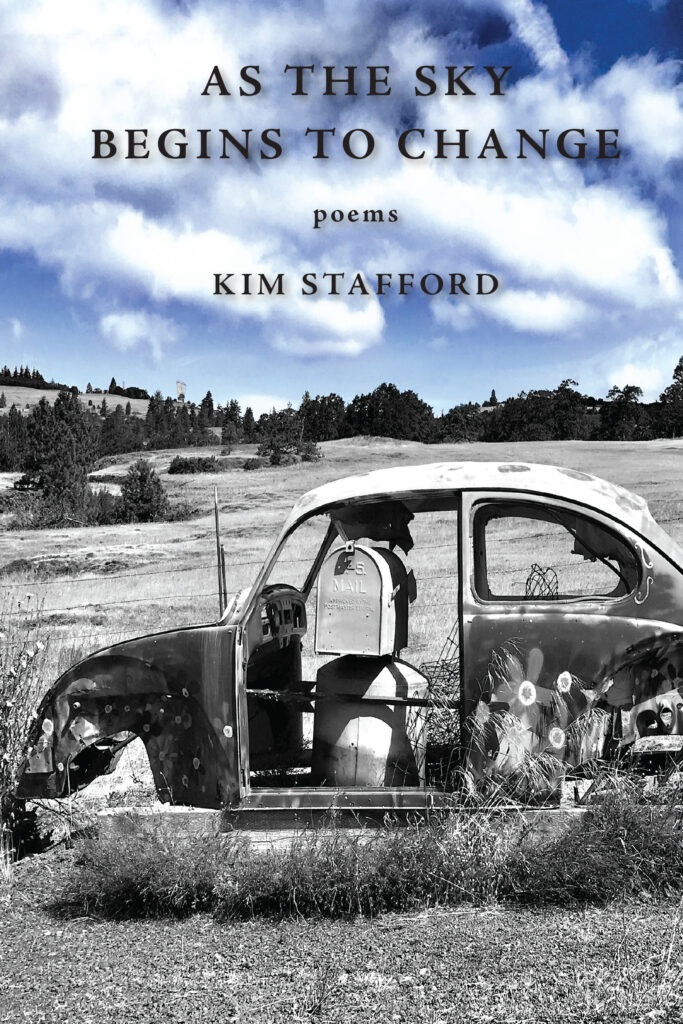
1. As the Sky Begins to Change
Translated from French by Jordan Stump
As the Sky Begins to Change is a book of poems to wake the world, lyric anthems for earth and kin.
In his third poetry collection from Red Hen Press, Kim Stafford gathers poems that sing with empathy, humor, witness, and story. Poems in this book have been set to music, quoted in the New York Times, posted online in the Academy of American Poets Poem-a-Day series, gathered in a chapbook sold to benefit Ukrainian refugees, posted online in response to Supreme Court decisions, composed for a painter’s gallery opening, and in other ways engaged a world at war with itself, testifying for the human project hungry for kinship, exiled from bounty, and otherwise thirsting for the oxygen of healing song.
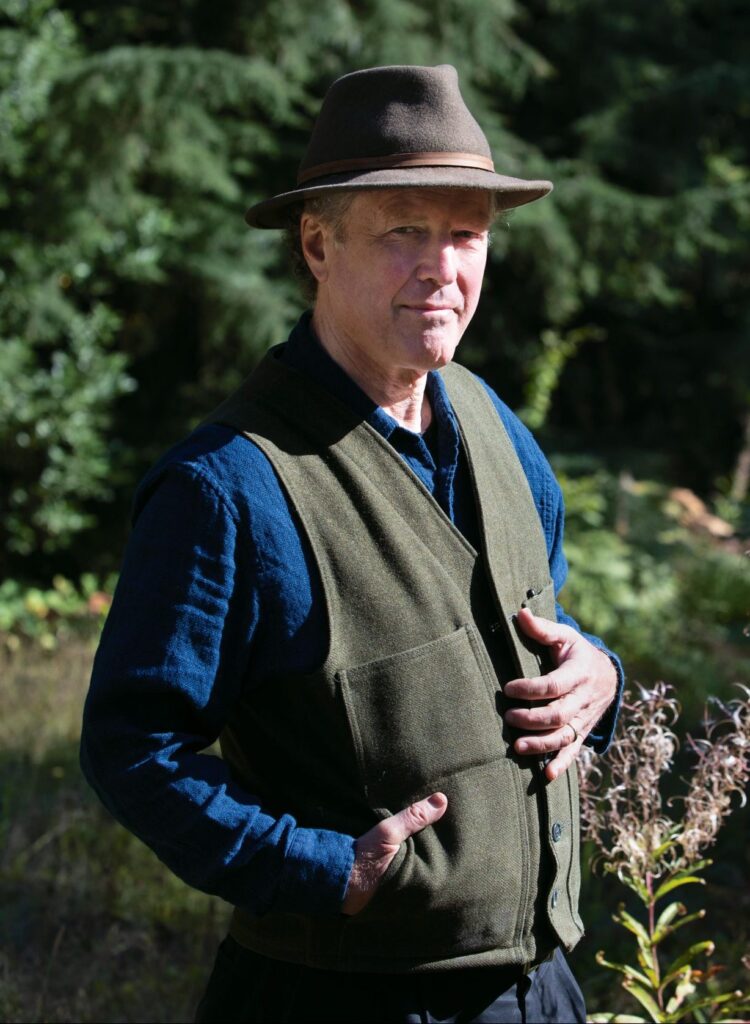
Kim Stafford
Kim Stafford is a writer and teacher in Oregon, and founding director of the Northwest Writing Institute at Lewis & Clark College. His poetry titles include A Gypsy’s History of the World (Copper Canyon Press), and Wild Honey, Tough Salt (Red Hen Press). He has published a biography, Early Morning: Remembering My Father, William Stafford (Graywolf Press), We Got Here Together (a children’s book from Harcourt-Brace), and a book about writing and teaching: The Muses Among Us: Eloquent Listening and Other Pleasures of the Writer’s Craft (University of Georgia Press).
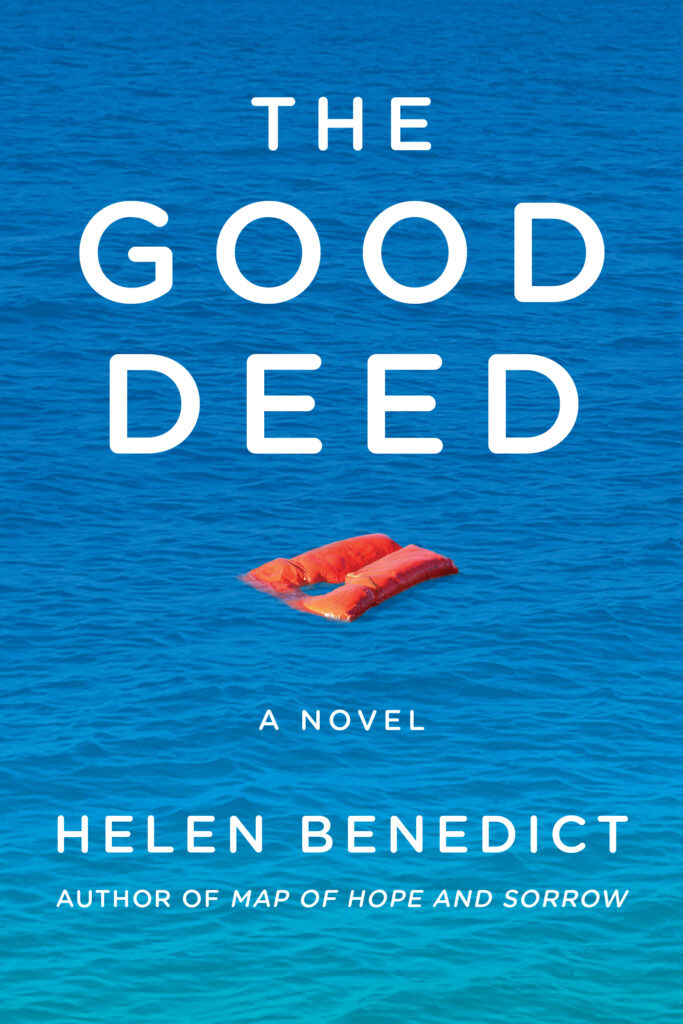
2. The Good Deed
In The Good Deed, Helen Benedict offers a stark, powerful portrait of women on opposite sides of a refugee camp in Greece: the refugees trapped inside, and the troubled American tourist whose good intentions morph into a dangerous delusion, resulting in a poignant, layered novel on displacement and belonging, love and betrayal, and the jagged space between altruism and egoism.
Drawing from four years of interviews with refugees on Samos, along with twelve previous years of work on the Iraq War, Benedict has written The Good Deed as a series of lyrical, intensely felt alternating voices, following these women’s everyday lives in the camp, as well each of their backstories—stories of families, love, secrets, violence, war, and flight. When Hilma, the American, unwittingly does a “good deed,” she triggers a crisis that brings her and the refugee women into a conflict that escalates dramatically as each character struggles for what she needs.
In essence, The Good Deed is about the struggle never to lose hope, even in the face of war and the world’s hostility to refugees; the complexities that arise out of trying to help others; the healing power of friendship; and the everlasting bonds between mothers and children.
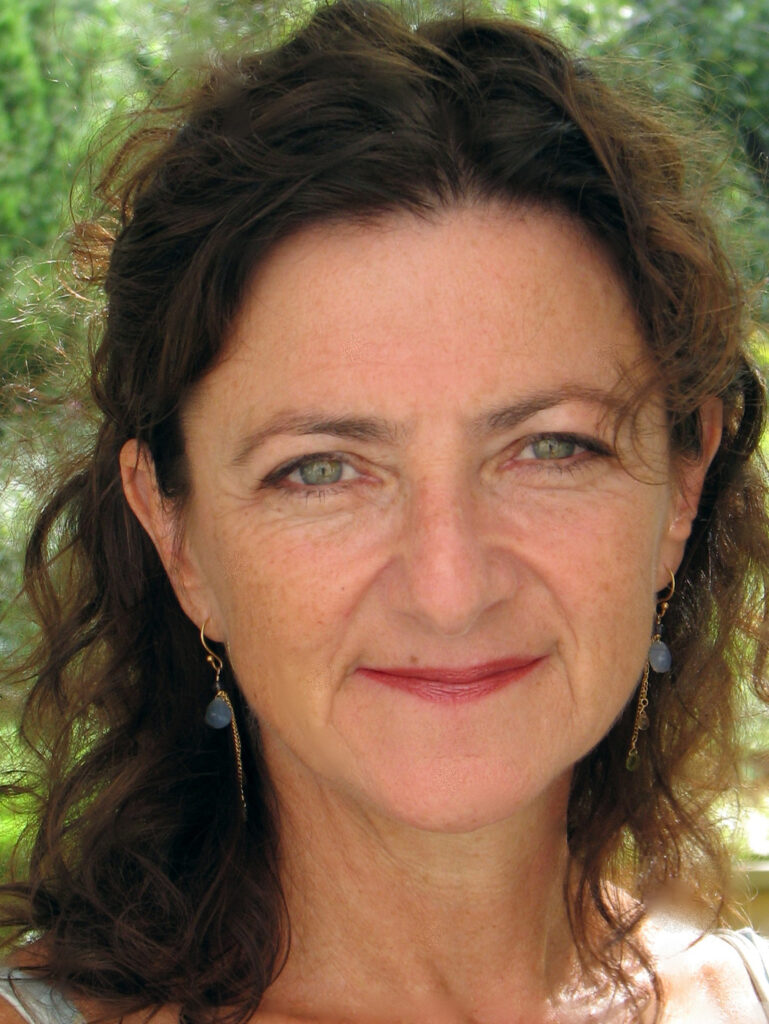
About Helen Benedict
Helen Benedict, a professor at Columbia University, has been writing about refugees and war for many years, both in her nonfiction, Map of Hope & Sorrow: Stories of Refugees Trapped in Greece, published in 2022, and her two most recent novels, Wolf Season and Sand Queen. A recipient of the 2021 PEN Jean Stein Grant for Literary Oral History, the Ida B. Wells Award for Bravery in Journalism, and the James Aronson Award for Social Justice Journalism for her exposure of sexual predation in the military, Benedict is also the author of The Lonely Soldier: The Private War of Women at War Serving in Iraq.
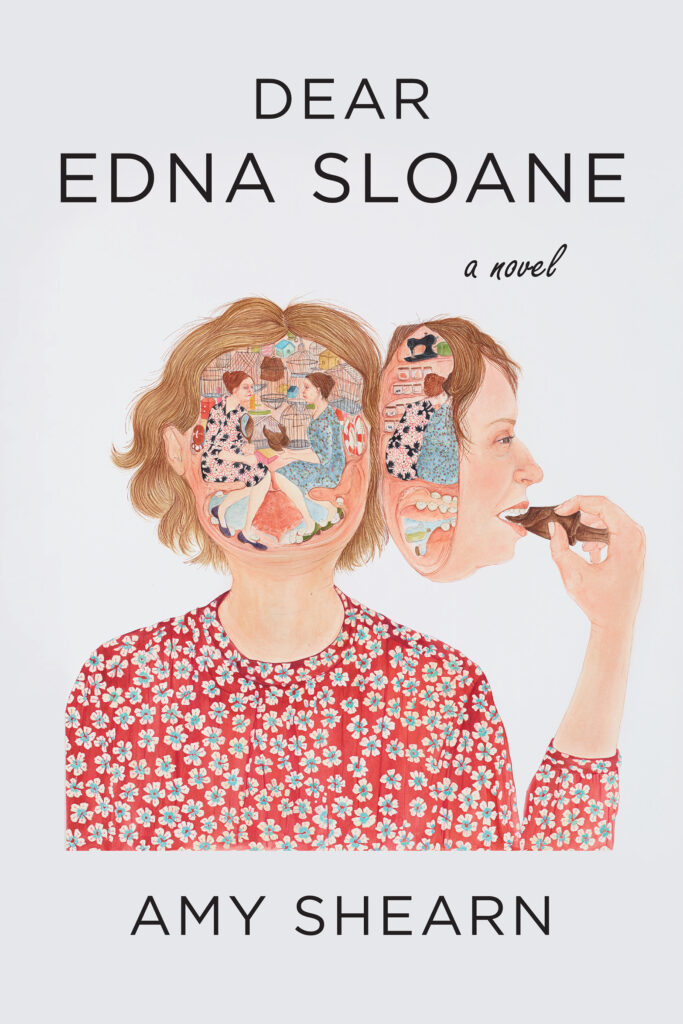
3. Dear Edna Sloane
Dear Edna Sloane is a funny, fast-paced epistolary novel about fame, writers, ambition, and the ups and downs of a creative life.
Edna Sloane was a promising author at the top of her game. Her debut novel was an instant classic and commercial success, vaulting her into the heady echelons of the 1980s New York City lit scene. Then she disappeared and was largely forgotten. Decades later, Seth Edwards is an aspiring writer and editor who feels he’s done all the right things to achieve literary success, but despairs that his dream will be forever out of reach. He becomes obsessed with the idea that if he can rediscover Sloane, it will make his career. His search for her leads to unexpected places and connections, and the epistolary correspondence that ensues makes up this book, a novel infused with insights and meditations about what our cultural obsession with the “next big thing” does to literature, and what it means to be a creative person in the world.
Amy Shearn
Amy Shearn is the author of the novels How Far Is the Ocean from Here, featured as a notable debut by Poets & Writers and the Chicago Tribune; The Mermaid of Brooklyn, a selection of Target’s Emerging Authors program and a Hudson News Summer Reads pick; and Unseen City, the 2021 Independent Publisher Book Awards’ Gold Medal in Literary Fiction. Her essays have appeared in the New York Times Modern Love column, O, The Oprah Magazine, and several anthologies. A native Midwesterner, she earned an MFA from the University of Minnesota, and now lives in Brooklyn, New York, with her two children.
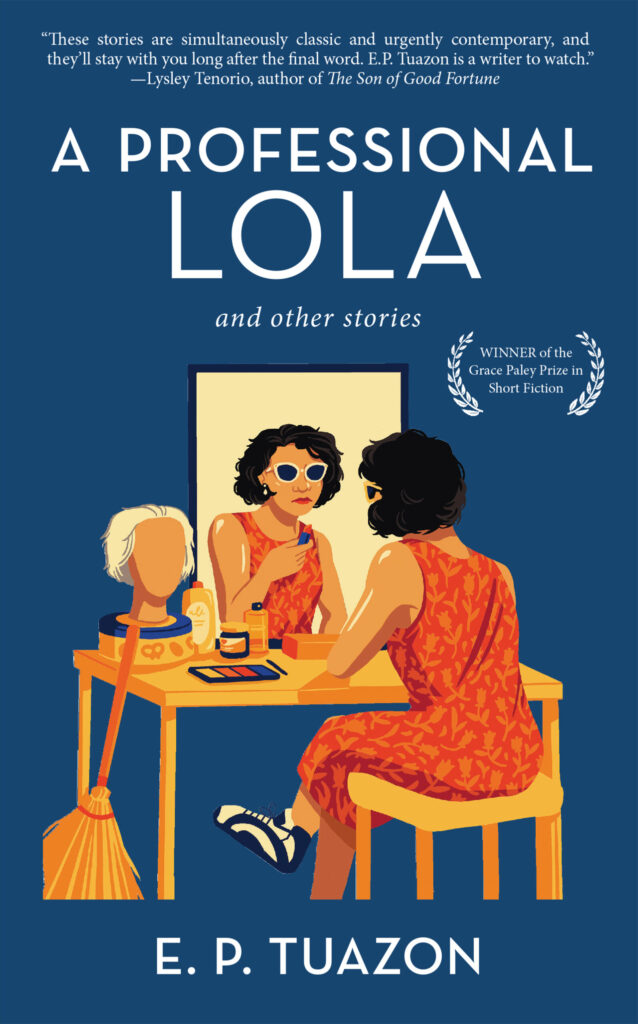
4. A Professional Lola
A Professional Lola is a collection of short stories that blend literary fiction with the surreal to present the contemporary Filipino American experience and its universal themes of love, family, and identity. A family hires an actress to play their beloved grandmother at a party; a couple craving Filipino food rob a panaderya; a coven of Filipino witches cast a spell on their husbands; a Lolo transforms into a Lola. These are just a few of the stories in the collection that represent its roster of stories beautifully grounded in culture and vividly and meticulously painted to make the absurd seem mundane and the commonplace, sinister. Professional Lola embodies the joy, mystery, humor, sadness, hunger, and family that inhabit modern-day Filipino American virtues.

E.P. Tuazon
E. P. Tuazon is a Filipino American writer from Los Angeles. They have work in several publications such as The Rumpus, Lunch Ticket, Peatsmoke, and Five South. His work was chosen by ZZ Packer as the winner of the 2022 AWP Grace Paley Prize in Short Fiction. They are currently a member of Advintage Press and The Blank Page Writing Club at The Open Book, Canyon Country. In their spare time, they like to go to Filipino seafood markets to gossip with the crabs.
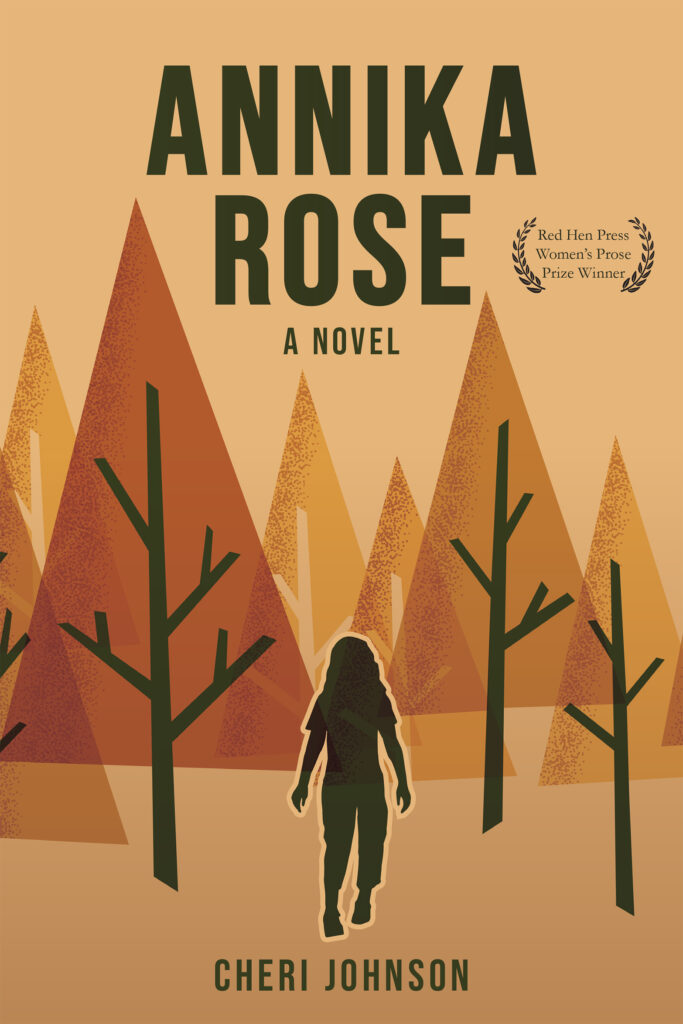
5. Annika Rose
Ancient and contemporary myths—including both Ovid’s Metamorphoses and Ira Levin’s Rosemary’s Baby—overlay a coming-of-age story set in remote northern Minnesota.
Seventeen-year-old Annika Rose and her father Wes have spent the years since the death of Annika’s mother in self-imposed social isolation on their farm on the edge of the woods. When a young woman named Tina moves into a house down the road, the result is a sudden explosion of feelings in both father and daughter and a fierce rivalry. At stake in the competition is not only their relationship, but the life of the vulnerable young woman at the center of it all.

Cheri Johnson Cheri Johnson has won awards in fiction from the McKnight Foundation, the Bush Foundation, Yaddo, and the Fine Arts Work Center in Provincetown. She studied writing at the University of Minnesota, Hollins University, and Augsburg University. Her chapbook of poems, Fun & Games, was published by Finishing Line Press in 2009, and she’s written two series of nonfiction books for Full Tilt Press. Crocus Hill: A Ghost Story, a literary performance project she created with the composer Julie Johnson, the filmmaker D.J. Mendel, and the new-music ensemble Zeitgeist, was supported by the Knight Foundation. She lives in Minneapolis, Minnesota.
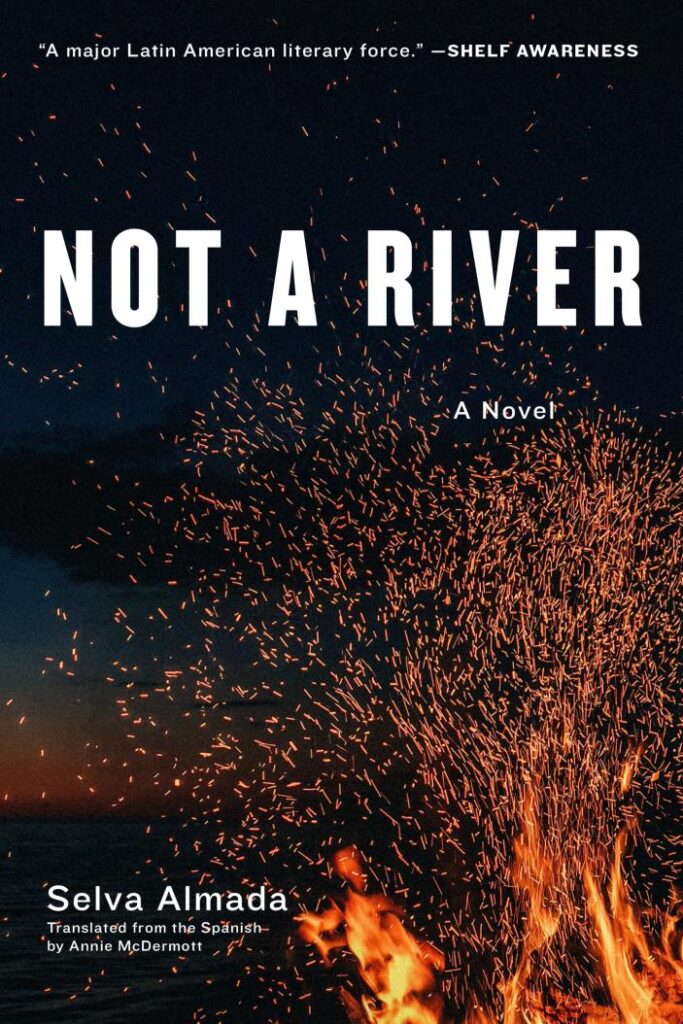
6. Not A River
It’s not a river, it’s this river.
A hot, motionless afternoon. Enero and El Negro are fishing with Tilo, their dead friend’s teenage son. After hours of struggling with a hooked stingray, Enero aims his revolver into the water and shoots it. They hang the ray’s enormous corpse from a tree at their campsite and let it go to rot, drawing the attention of some local islanders and igniting a long-simmering fury toward outsiders and their carelessness. It’s only the two sisters—the teenage nieces of one of the locals, Aguirre—with their hair black as cowbird feathers and giving off the scent of green grass, who are curious about the trio and invite them to a dance. But the girls are not quite as they seem. As night approaches and tensions rise, Enero and El Negro return to the charged memories of their friend who years ago drowned in this same river.
As uneasy and saturated as a prophetic dream, Not a River is another extraordinary novel by Selva Almada about masculinity, guilt, and irrepressible desire, written in a style that is spare and timeless.
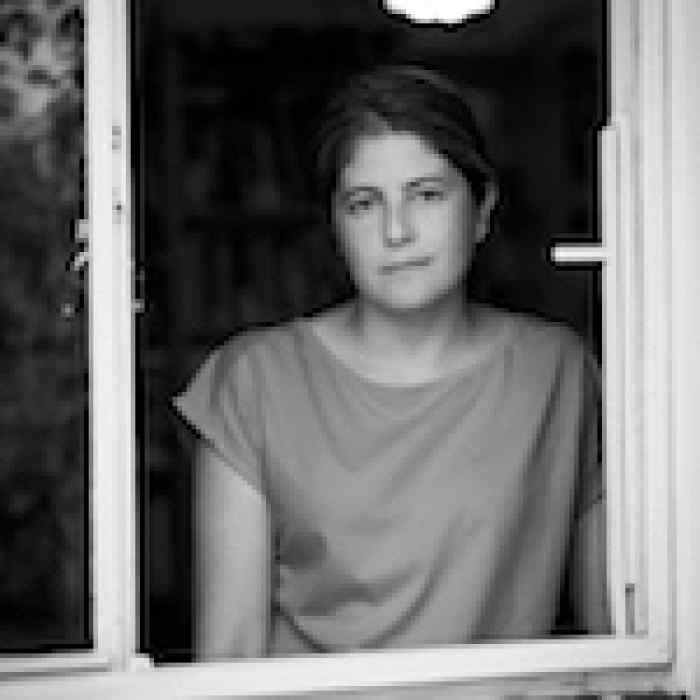
Selva Almada Selva Almada is the author of Brickmakers, Dead Girls, and The Wind That Lays Waste. She is considered one of the most potent literary voices in Argentina and Latin America.
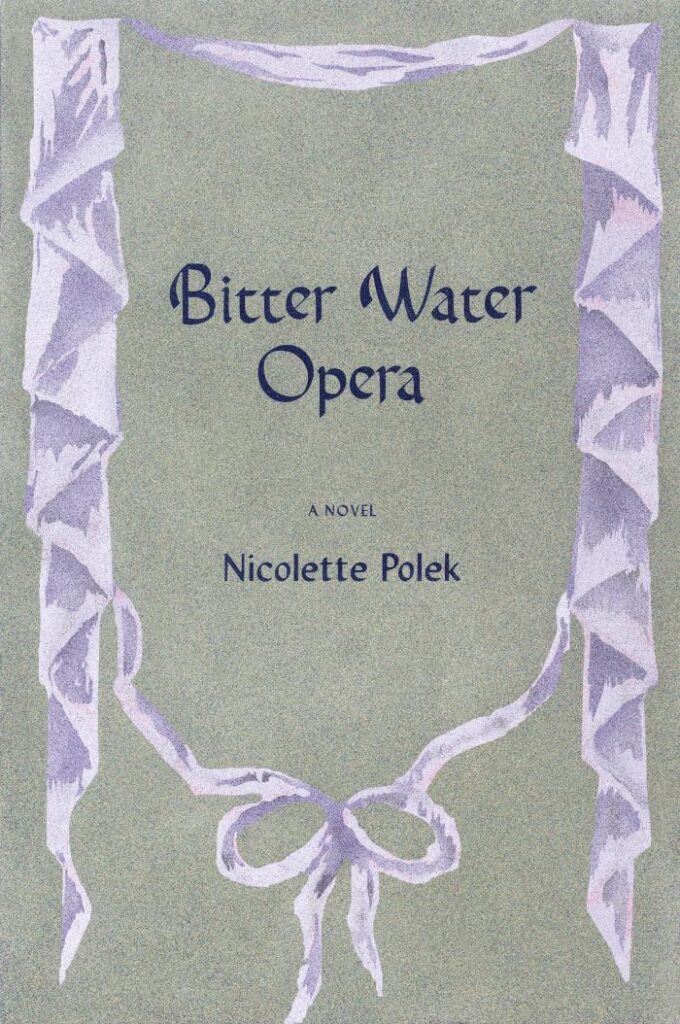
7. Bitter Water Opera
In 1967, the dancer Marta Becket and her husband were traveling through Death Valley Junction when they came across an abandoned theater. Marta decided it was hers. She painted her ideal audience on its walls and danced her own dances until her death five decades later.
In the present day, Gia has ended a relationship and taken a leave from her job in film studies at a university. She is sleeping fifteen hours a night and ignoring calls from her mother. In a library archive, she comes across a photo of Marta Becket and decides to write her a letter. Soon Marta magically appears in her home.
Gia hopes Marta Becket will guide her out of her despair. But is Marta—the example of her single-minded, solitary life—enough? Through precise, vivid vignettes, Bitter Water Opera follows Gia as she resists the urge to escape into herself and struggles to form a lasting connection to the world. Her search has her reckoning with a set of terrifying charcoal drawings on her garage walls, a corpse in the middle of a pond, a crooked pear sapling, and other mysterious entities before bringing her to Marta’s theater, the Amargosa Opera House. There in the desert, Gia finds one answer.
In this brief, astonishing novel, Nicolette Polek describes an individual awakening to faith while exploring our deepest existential questions. How do we look beyond ourselves? Where do words go? What is art for?
Nicolette Polek is the author of Imaginary Museums (Soft Skull Press, 2020). She is a recipient of a Rona Jaffe Writers’ Award, and her work has appeared in the Paris Review Daily, BOMB, New York Tyrant, The Atlantic, and elsewhere. She holds an MFA in Fiction from the University of Maryland, and a masters from Yale Divinity School. She is from Northeast Ohio.
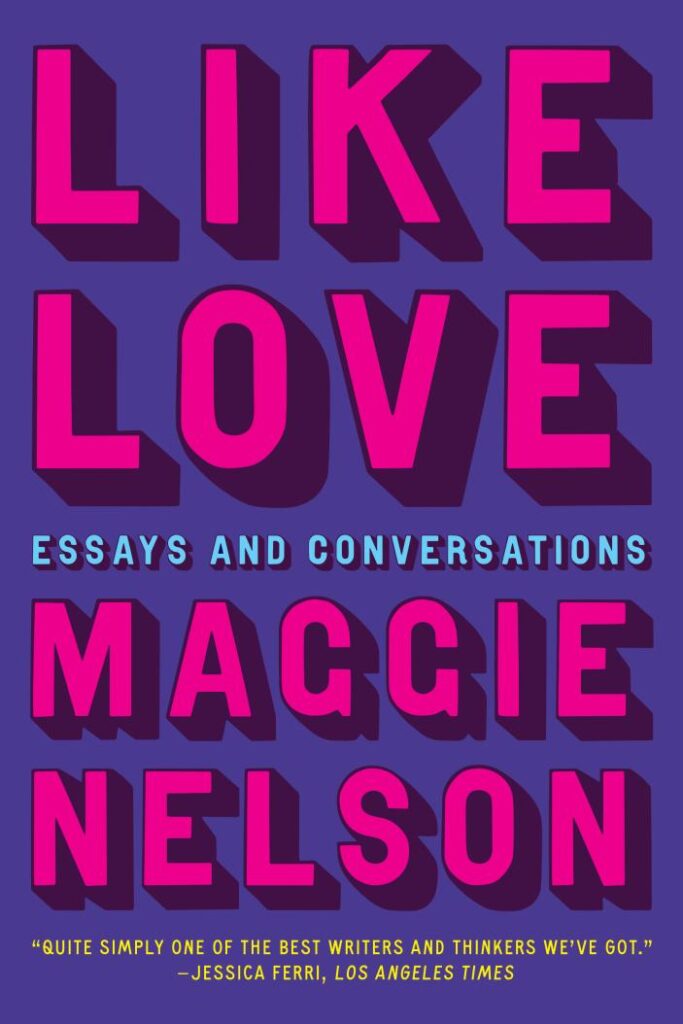
8. Like Love
Like Love is a momentous, raucous collection of essays drawn from twenty years of Maggie Nelson’s brilliant work. These profiles, reviews, remembrances, tributes, and critical essays, as well as several conversations with friends and idols, bring to life Nelson’s passion for dialogue and dissent. The range of subjects is wide—from Prince to Carolee Schneemann to Matthew Barney to Lhasa de Sela to Kara Walker—but certain themes recur: intergenerational exchange; love and friendship; feminist and queer issues, especially as they shift over time; subversion, transgression, and perversity; the roles of the critic and of language in relation to visual and performance arts; forces that feed or impede certain bodies and creators; and the fruits and follies of a life spent devoted to making.
Arranged chronologically, Like Love shows the writing, thinking, feeling, reading, looking, and conversing that occupied Nelson while writing iconic books such as Bluets and The Argonauts. As such, it is a portrait of a time, an anarchic party rich with wild guests, a window into Nelson’s own development, and a testament to the profound sustenance offered by art and artists.

Maggie Nelson is the author of several books of prose and poetry including The Red Parts, Bluets, the National Book Critics Circle Award–winner The Argonauts, and On Freedom. She teaches at the University of Southern California and lives in Los Angeles.
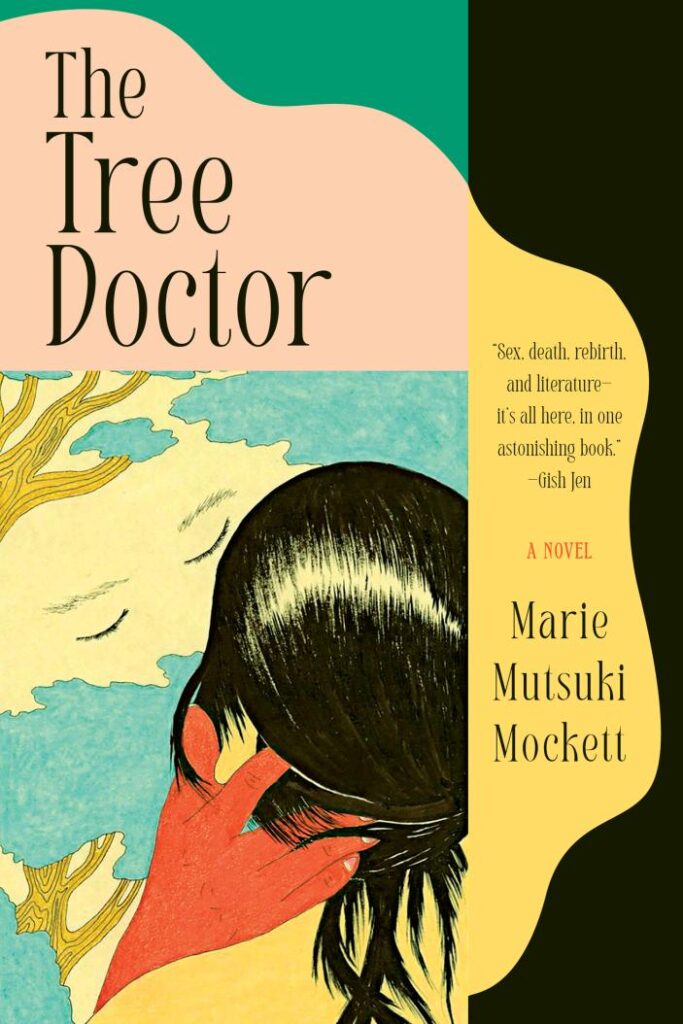
9. The Tree Doctor
When the unnamed narrator of Marie Mutsuki Mockett’s stirring second novel returns to Carmel, California, to care for her mother, she finds herself stranded at the outset of the disease. With her husband and children back in Hong Kong, and her Japanese mother steadily declining in a care facility two hours away, she becomes preoccupied with her mother’s garden—convinced it contains a kind of visual puzzle—and the dormant cherry tree within it.
Caught between tending to an unwell parent and the weight of obligation to her distant daughters and husband, she becomes isolated and unmoored. She soon starts a torrid affair with an arborist who is equally fascinated by her mother’s garden, and together they embark on reviving it. Increasingly engrossed by the garden, and by the awakening of her own body, she comes to see her mother’s illness as part of a natural order in which things are perpetually living and dying, consuming and being consumed. All the while, she struggles to teach (remotely) Lady Murasaki’s eleventh-century novel, The Tale of Genji, which turns out to resonate eerily with the conditions of contemporary society in the grip of a pandemic.
The Tree Doctor is a powerful, beautifully written novel full of bodily pleasure, intense observation of nature, and a profound reckoning with the passage of time both within ourselves and in the world we inhabit.

Marie Mutsuki Mockett is the author of a previous novel, Picking Bones from Ash, and two books of nonfiction, American Harvest, which won the Nebraska Book Award, and Where the Dead Pause, and the Japanese Say Goodbye, which was a finalist for the PEN Open Book Award.
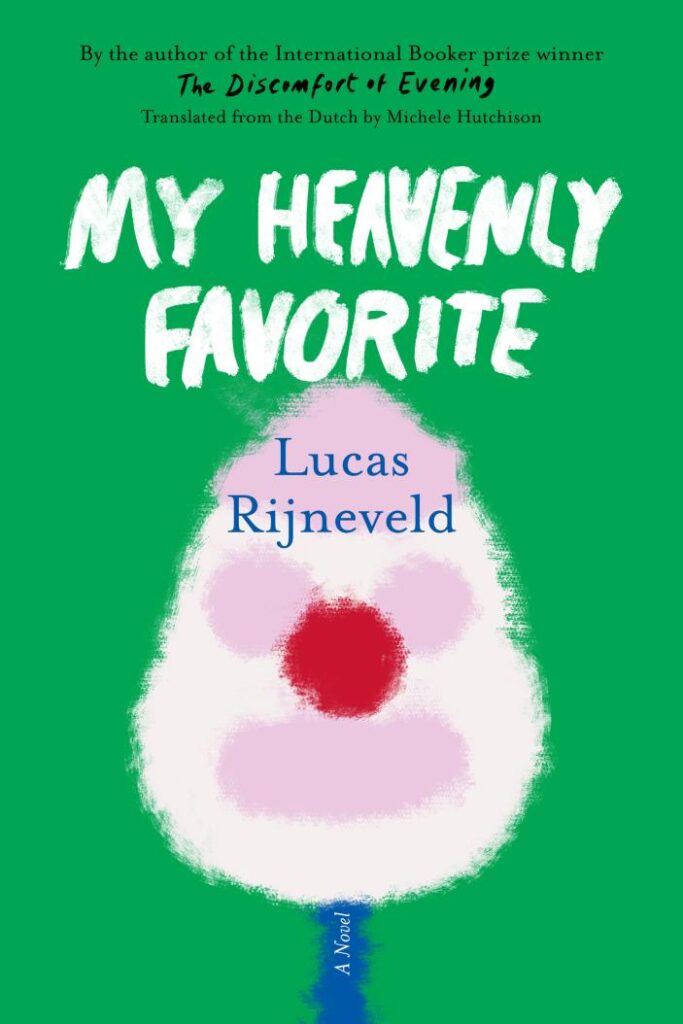
10. My Heavenly Favorite
A confession, a lament, a mad gush of grief and obsession, My Heavenly Favorite is the remarkable and chilling successor to Lucas Rijneveld’s international sensation, The Discomfort of Evening. It tells the story of a veterinarian who visits a farm in the Dutch countryside where he becomes enraptured by his “Favorite”—the farmer’s daughter. She hovers on the precipice of adolescence, and longs to have a boy’s body. The veterinarian seems to be a tantalizing possible path out from the constrictions of her conservative rural life.
Narrated after the veterinarian has been punished for his crimes, Rijneveld’s audacious, profane novel is powered by the paradoxical beauty of its prose, which holds the reader fast to the page. Rijneveld refracts the contours of the Lolita story with a kind of perverse glee, taking the reader into otherwise unimaginable spaces full of pop lyrics, horror novels, the Favorite’s fantasized conversations with Freud and Hitler, and her dreams of flight and destruction and transcendence.
An unflinching depiction of abjection and a pointed excavation of taboos and social norms, My Heavenly Favorite establishes Rijneveld as one of the most daring and brilliant writers on the world stage.

Lucas Rijneveld grew up in a Reformed farming family in North Brabant before moving to Utrecht. He is the author of The Discomfort of Evening, which was the first Dutch book to win the International Booker Prize, as well as three poetry collections.
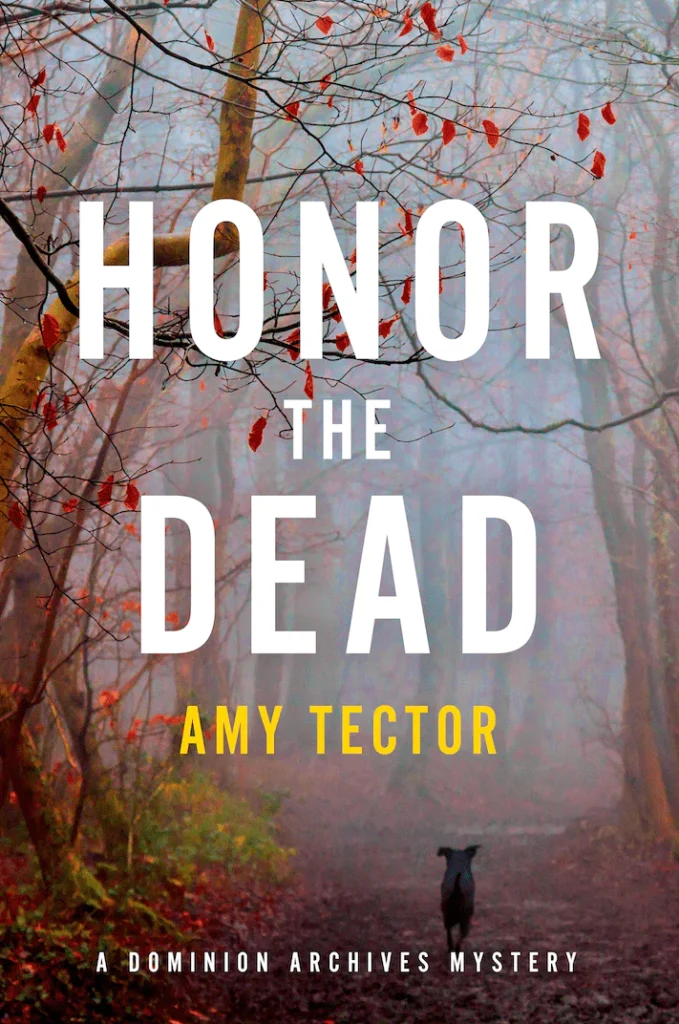
11. Honor the Dead
Dr. Cate Spencer is back in this highly-anticipated third installment of the Dominion Archives Mysteries.
It’s been a few months since the events of Speak for the Dead and Dr. Cate Spencer is seeking a temporary reprieve in the bucolic Eastern Townships of Quebec where she can come to terms with her brother’s death, find inner peace, build new relationships, and await a decision about her future. But when a man at a neighboring farm is shot through the eye with deadly accuracy, a metal detector lying next to him, Cate can’t help but investigate.
As she delves deeper into the mystery, Cate uncovers a world of drugs, lies, and violence hidden beneath the picturesque town, all of which threaten the tenuous peace she’s built for herself. As long-buried secrets and a centuries-old mystery become exposed, what will Cate lose to find the answers she seeks?
A gripping new mystery, Honor the Dead is a must-read for new and old Dominion Archives fans alike!
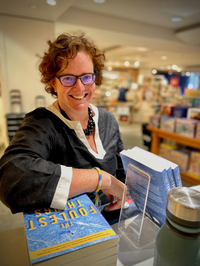
Amy Tector was born and raised in the rolling hills of Quebec’s Eastern Townships. She has worked in archives for the past twenty years and has found some pretty amazing things, including lost letters, mysterious notes, and even a whale’s ear. Amy spent many years as an expat, living in Brussels and in The Hague, where she worked for the International Criminal Tribunal for War Crimes in Yugoslavia. She lives in Ottawa, Canada, with her daughter, dog, and husband.
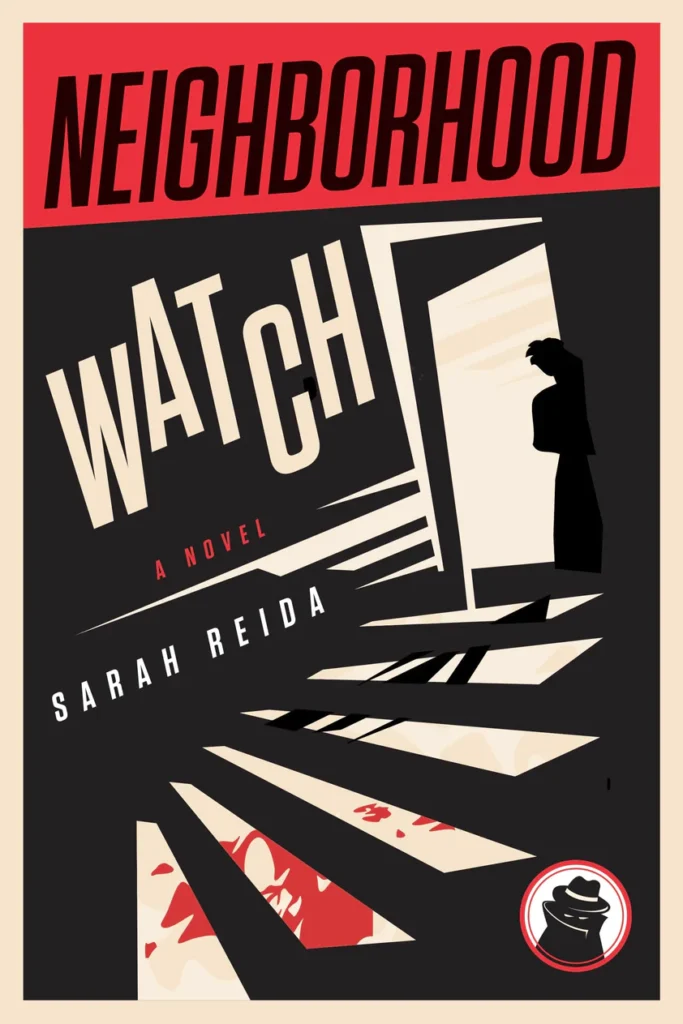
12. Neighborhood Watch
A killer terrorizes the morally bankrupt residents of an upscale neighborhood, leading them to turn to—and on—one another to survive.
The neighborhood of Oleander Court is the poster child for suburban bliss. The residents compare lawns beautified by hired help. They monitor home values. They toss perfect furniture because they wanted tapioca, not beige.
But when a string of murders rips through the neighborhood, suspicions abound as new secrets come to light. And as more and more bodies are taken away, it becomes clear that the killer is strategically selecting each and every victim, picking off the shallowest, most wasteful of the lot in spectacular fashion and leaving everyone in the neighborhood to wonder: Who’s next?
While most of their neighbors scatter like well-dressed cockroaches, a small group of the neighborhood ladies team up to solve their local mystery and restore their once-peaceful lives. But is this ragtag collection of amateur sleuths truly a united front? With reputations, freedom, and personal sanity on the line, the ladies must unmask the killer . . . even if the killer is among them.
Sarah Reida is an attorney whose work focuses on assisting veteran businesses performing federal government contracts. As an author, Sarah has published two middle grade books: Monsterville: A Lissa Black Production (2016) and All Sales Final (a Kirkus Reviews Best Indie Book of 2020). She lives with her husband and two young children near Atlanta, Georgia.
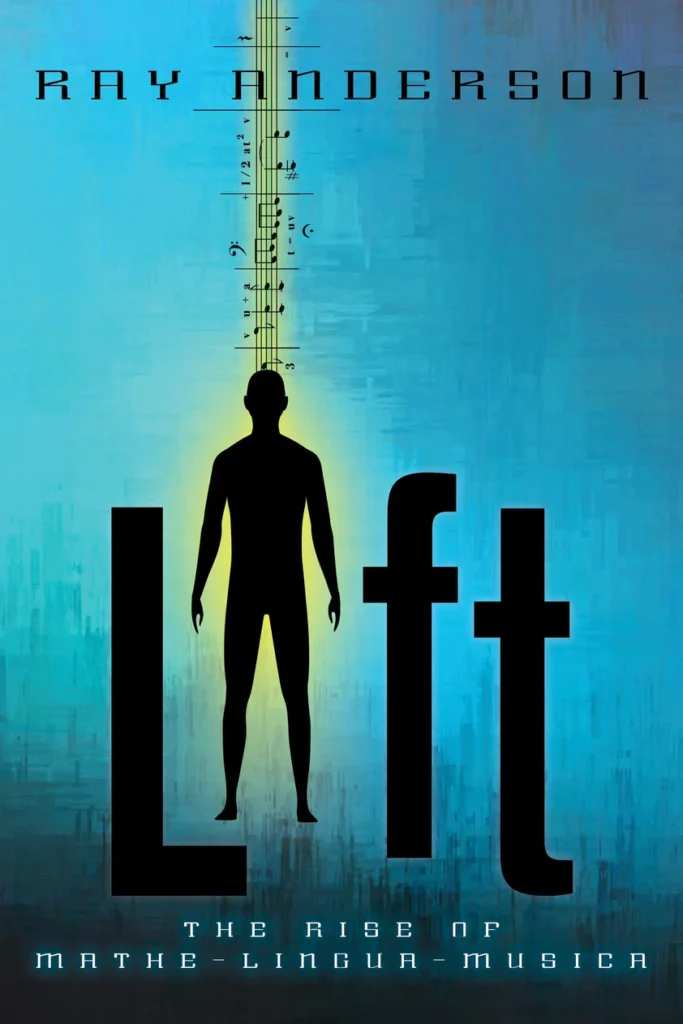
13. Lift
With Earth on the brink of total annihilation, can a new universal language unite the world enough to save it?
It’s 2422 and the world’s governing mathematicians have calculated that society’s struggles with rampant war and homicide have put humanity on a crash-course with extinction. With an estimated fifteen months left until humankind’s total annihilation, the World Council of Mathematicians (WCM) determine the only way out of the crisis is to create the optimum language for humans, creating common understanding across all cultures and allowing them to work together for their joint salvation.
The WCM and Charles De Costa, a brilliant mathematics student, must rely on LIFT, a scientific breakthrough that allows them to enlist the aid of the greatest minds in history, to create this new world language based on mathematics, linguistics, and music. Can the great minds of the past help lead humanity to a better future? Can this new language be created in time? Or will society’s continued evil and miscommunication lead the world to an inevitable end?
Ray Anderson is a hiker and the author of the AWOL Thriller novel series, which includes The Trail (2015), Sierra (2016), and The Divide (2020). Anderson has done a radio column on hiking. He has also written columns for the Appalachian Mountain Club (AMC) newsletter and contributed to the local news site, Patch.com, for Hingham, Massachusetts. Anderson lives with his wife, Nancy, near Boston.

Continue Reading:
Article originally Published in the Mar / Apr / May 2024 Issue: Indie in Bloom.
